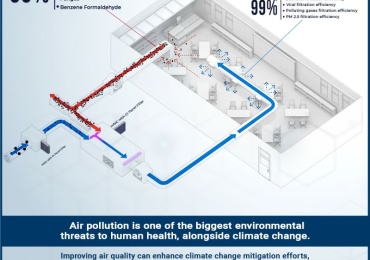Despite the rapid rise in environmental pollutants, the causal pathways leading to adverse health effects is often complex and poorly understood. Air pollution has become the world’s single biggest environmental health risk, linked to around 4.2 million deaths every year according to a recent World Health Organization (WHO) report. Children, the elderly, and women are most vulnerable to potential indoor air pollution health effects because they spend more time in the home environment. The new data further reveals a stronger link between, indoor and outdoor air pollution exposure and cardiovascular diseases, such as strokes and ischemic heart disease, as well as between air pollution and cancer. The role of air pollution in the development of respiratory diseases, including acute respiratory infections and chronic obstructive pulmonary diseases, is well known. While both indoor and outdoor pollution affect health, recent statistics on the impact of household indoor pollutants (HAP) is alarming. The WHO factsheet on HAP and health states that 3.8 million premature deaths annually – including stroke, ischemic heart disease, chronic obstructive pulmonary disease (COPD) and lung cancer are attributed to exposure to household air pollution.
Studies appear to suggest, that reduction in particulate matter and allergens results in reducing symptoms and in certain cases, preventing disease progression across all age groups, including the elderly and children. The evidence is apparent, in chronic respiratory diseases, such as asthma and in cardiovascular health. Reduction in particulate matter and allergens is achieved successfully through efficient air filters. Use of air filters is one of the suggested strategies to improve indoor air quality. Graphene advanced air filter systems are now available which efficiently remove particulate matter, resulting in significant health benefits to patients of asthma and cardiovascular disease.
( Source: National Library of Medicine: Enhancing indoor air quality –The air filter advantage)
World Health Organization National Institute of Tuberculosis and Respiratory Diseases (NITRD) Central Pollution Control Board (CPCB) UN Environment Programme





